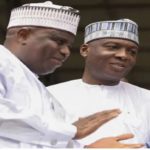Security challenges have continued to deteriorate with the growing distrust between the government and Nigerians who have expressed dissatisfaction and disappointment with the way government responds to the killings in the country.
The recent massacre of thirty stranded motorists and passengers in Auno village of Borno State is very sad and frightening. While Nigerians were mourning the death of innocent travellers in Borno, another sad story of killings by armed bandits filtered in; it was reported that a family of 16 was locked up and burned to ashes in a village in Giwa Local Government area of Kaduna State by suspected bandits.
The incessant killings have become a daily occurrence in the country. The frequent attacks by bandits and Boko Haram have indicated that the insecurity is not yet over. It is also proved there is no end in sight of the horrific killings in the land. The persistent attacks on defenceless Nigerians have raised several questions on whether the primary function of government which is the protection of lives and properties has been achieved or not.
In the last decade, the country has not known peace; it has turned into Golgotha where lives are being crucified with impunity. Sadly, what Nigerians continue to hear from the constituted authorities is that Boko Haram has been technically defeated or the government is on top of the security situation.
These assurances from government officials have failed to stem the tide of killings in the country. No wonder, there have been calls from different angles that the president should sack his service chiefs.
Nigerians are worried about the resurgence in killings and the supersonic speed with which the murderers carry out their attacks.
The carrot and stick approach to insecurity has yielded no desirable result. However, the sudden demand for community policing in the country is a knock on our security system failures. There is agitation for the establishment of regional and states security outfits to checkmate the rise of insecurity in the country. Before Nigerians get killed completely, the government should swiftly move and contain it.
Ibrahim Mustapha Pambegua,
Kaduna state.
ALSO READ FROM NIGERIAN TRIBUNE
- Bandits Storm Kaduna Airport, Stop Aircraft From Taking Off
- Lagos Socialite Who Distributed Petrol As Souvenir Sentenced To Two Years Imprisonment, Gets Fine Option
“Absolutely, When we came with the Buhari government in 2015 I became the minister. We were committed to a roadmap to establish a National Carrier, to concession the airports, to set up a leasing company, to establish cargo facilities and we have been doing that.”
On why the Buhari government wanted a national carrier, the minister responded: “Nigeria is situated at the centre of Africa, equidistant from all locations in Africa. 30.4 million square kilometres miles, 1.5 billion people, very green land. If Central and Eastern Africa is the belt of the continent, then Nigeria is the buckle. 200 million people and rising middle class, propensity to fly is high. Nigeria is a candidate for National Carrier.”
Sirika who insisted that the coming national carrier will be private sector driven added; “Private. Yes. 5 per cent government and no government stepping right in that company, no government control, no membership of government on board. Totally private and committed.
“Whatever we say we will do as a government since 2015, it has happened. that is why Tim Clark of Emirates, Qatar Airways and all of them are looking to go into Nigeria in multiple frequencies and multiple landing points because Nigeria is the right place for the airline business.
How Workplace Sexual Harassment Forces Many Out Of Their Dream Jobs
FG expresses commitment towards private driven aviation sector






